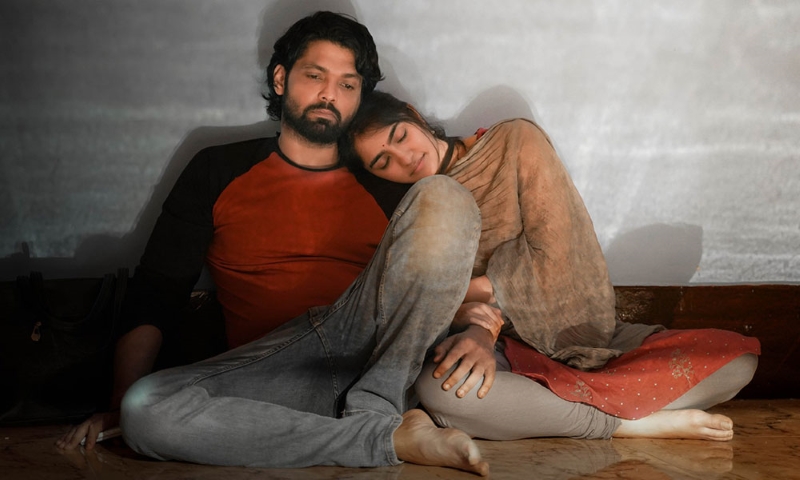Kannada Movie Review: Sapta Sagaradaache Ello (Side A) feels like the beginning of something big for the classical romantic drama

With the tragic romance seemingly deemed out-of-vogue by Hollywood and Bollywood alike, Sapta Sagaradaache Ello (Side A) stands a powerful announcement that the Kannada film industry may be here to fill the void. There’s a certain classical timelessness to the movie’s approach to romantic storytelling that registers as a feeling, right from the start. We’re introduced to the focal couple in the midst of a squabble that only goes on to underscore the way they perfectly complement each other. But there’s also a deep foreboding: as Manu (Rakshit Shetty) speeds down the road in his employer’s expensive Mercedes while Priya (Rukmini Vasanth) begs him to slow down – think of how many years of salary he would owe if he totaled the vehicle! – we know in our bones that this trip is headed towards an ominous destination. There’s a lump in our throat well before we even know why.
But the movie also departs from tradition where it counts. In the early going, we’re spared the long-winded and conventional romantic backstory in favor of smaller, tenderer moments that bring us into the relationship. There’s no meet-cute, no quirky foreplay – just human glimpses of a young couple navigating an authentic (albeit still cinematically heightened) lower-middle-class reality. It’s hard not to get invested in the two of them early on (even as he makes some classically bad decisions). Manu works as a driver for a wealthy family, while Priya is in her final year of school but fantasizes about becoming a famous singer. Shopping for an apartment, they one day decide to pose as a much more well-to-do couple and tour a lavish penthouse, lingering on the balcony together and dreaming of a prosperous future. She yearns to one day have the means to buy a home by the sea, where she grew up, but she’s also perfectly content with the more modest life that they’re building.
Manu, the more impulsive and risk-taking of the two, succumbs to self-imposed pressure to make Priya’s wildest dreams a reality. When his employer’s son recklessly kills an elderly man with his car and flees from the scene before being apprehended, Manu is approached with a substantial money offer to take the fall. Without Priya’s input, he accepts the proposition, assured he will spend maybe six months behind bars given the family’s legal resources. But when the patriarch who cut him the deal unexpectedly dies of a heart attack before the trial concludes, Manu’s sentence – and his time away from Priya – suddenly looks it may be a lot longer. In the grand tradition of romantic tragedies, we know this is not likely to end well.
We feel the couple’s romance even more strongly as it grows progressively fragile through their forced separation. The moments that they share together, during Priya’s short visits to the jail and the contact they are allowed in the courtroom, are poignant and charged. Scenes involving a cassette tape that Priya records for Manu (the film is set in 2010, so this is a bit more plausible than it would be today) also resonate. Both leads give affecting performances, emotionally responding to the tragic circumstances in ways that feel true to both their individual characters and the dynamic they’ve cultivated before our eyes. For as much strife as we know Manu and Priya are likely in for, there’s a genuine hope that underlines the viewing experience because we genuinely care for the two of them. They come across as real, relatable people who love each other, despite the extraordinary circumstance that Manu gets them into.
The movie falters somewhat, however, when it shifts its focus beyond its central romance. The story feels overly contrived – like countless TV dramas – when it focuses on the hierarchy of the inmate population of the jail, with Manu initially being taken under the wing of a kingpin who rules the roost (Ramesh Indira), only to be violently cast out when he’s no longer seen as potentially useful following the death of his well-connected employer. This subplot often feels like it’s laying the groundwork for eventual twists and turns that are beneath the film. A subsequent escape attempt, while well-executed from a suspense point-of-view, also stretches the limits of credibility. And then there’s another thread – pun intended – involving Manu’s work looming clothes In the prison, where he is mentored by an inmate with a mysterious past.
As the title indicates, Sapta Sagaradaache Ello (Side A) is the first half of a two-part saga, with Side B arriving in theaters next month. If one does not count the teaser for Side B tacked onto the end of this first installment as part of the film itself (I do not), the ending of Side A is a little weak. Co-writer/director Hemanth M. Rao approaches the final moments as more of a logical “pause point” rather than as a fully satisfying conclusion or cliffhanger. While this is reassuring on some level because it means the larger story is unlikely to descend into cheap theatrics – I dreaded that there would be a final twist involving the Ramesh Indira character and Manu’s deceased employer – it lacks a certain punch. The underwhelming nature of the ending makes the structure of this first film feel more like that of the first half of a season of a TV series, rather than a meticulously constructed two-part motion picture event.
That all said, the moving nature of the romance and the bond we develop with both of these lead characters should be more than enough to drive most viewers back to see how things conclude in Side B. I will definitely be there on opening weekend myself. It’s also worth mentioning, before I end this review, that the artistry of the filmmaking here is formidable, structural choices aside. Advaitha Gurumurthy’s cinematography deserves particular praise for the way it captures the characters at their rawest moments, while also establishing a refined set of visual poetics. The music, by Charan Raj, is also a marvel – not so showy that it ever overwhelms the moment or the characters, but also highly ‘listenable’ on its own.
Sapta Sagaradaache Ello (Side A) is far from a perfect film – or even a perfect first half – but in its strongest moments, it really sings. And like its wide-eyed protagonists, it dares to dream: in this case, of Sandalwood at the forefront of a fresh renaissance of the romantic drama.

